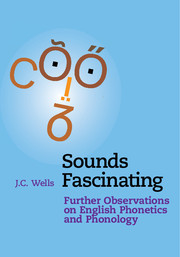13 - Classification
from PART III - APPLYING PHONETICS
Published online by Cambridge University Press: 05 September 2016
Summary
Fricative or Approximant?
A correspondent mentioned that she had come across a textbook in which English h was described as a voiceless glottal approximant. Given that in LPD I classify it as a voiceless glottal fricative, she wondered which is right, approximant or fricative.
I am not alone in classifying h as a fricative. That is how it is categorized on the IPA Chart; that is how Cruttenden, Roach, Collins, Ashby and Maidment, and other respected writers on English phonetics categorize it.
It is clear, however, that h is different from the other English voiceless fricatives f, θ, s, ʃ, in that it does not involve a constriction within the mouth cavity. Conventionally we classify it as a glottal fricative; but the constriction giving rise to the turbulence that we hear as friction may be not so much located at the glottis itself as distributed throughout the whole of the upper vocal tract. That is why Ladefoged and Maddison in The Sounds of the World's Languages (Blackwell 1996), at the beginning of their chapter on fricatives, comment:
Forms of h, ɦ in which a turbulent airstream is produced at the glottis are also sometimes classed as fricatives […], but it is more appropriate to consider them in the chapter on vowels.
At the end of the vowels chapter they mention the possible description of h as the voiceless counterpart of the vowel that follows.
In such cases it is more appropriate to regard h and ɦ as segments that have only a laryngeal specification, and are unmarked for all other features.
But in some languages, including Hebrew and Arabic, a glottal constriction is observable during the production of these sounds.
One problem with classifying h as an approximant is that voiceless approximants are by definition inaudible. (At least if approximants are defined as having no audible friction, i.e. no turbulent airflow and thus no audible aperiodic noise. Approximants used to be known as ‘frictionless continuants’.) If there's no friction and no voicing, there's nothing to hear. Anything you can hear during a voiceless h must be some sort of weak friction, resulting from some sort of weak turbulence, which must mean that h is some sort of weak fricative – but still a fricative.
- Type
- Chapter
- Information
- Sounds FascinatingFurther Observations on English Phonetics and Phonology, pp. 125 - 150Publisher: Cambridge University PressPrint publication year: 2016



